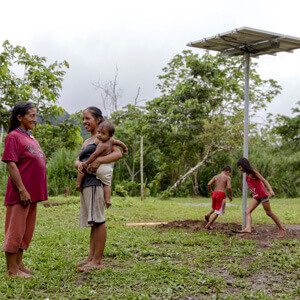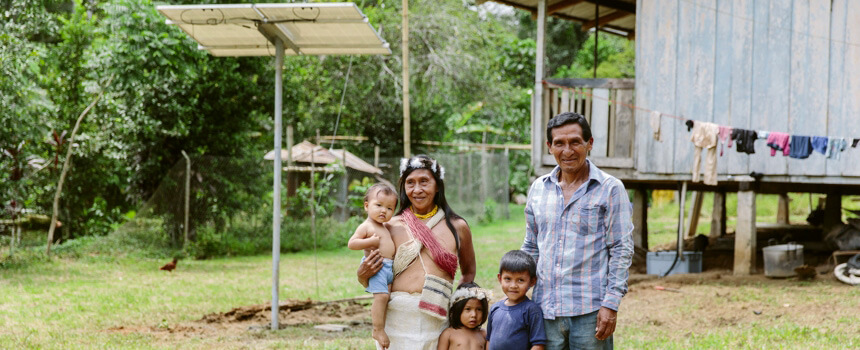 Protecting indigenous peoples
Protecting indigenous peoples
Better living conditions thanks to solar energy
Deep in the rainforest, many days away from the closest road access, live the indigenous people of the Cabécar. They are the largest indigenous community in Costa Rica, live self-sufficiently off agriculture and are isolated from the rest of the country. Access to electricity and light after dusk is also very limited. But the the new solar project will change this. A similar project has already been implemented among the indigenous Akaro community in Ecuador. One of the residents, Karina, talks about nature, her home and the challenges for the indigenous community. A situation that is similar for many indigenous groups in Latin America. "There are many people who have an interest in our forests and the underlying soil resources. The moment the oil companies arrive and want to tap the oil resources, they destroy everything: the rivers, the trees, the natural environment. We cannot allow that to happen. I am very grateful for the support of the solar project. Above all, I am grateful on behalf of my daughters and for the benefits for our entire community. With access to solar power, my daughters are able to walk safely at night and study for school," Karina says.
Necessity
Energy supply to indigenous communities in the tropical rain forest in the region of Telire, Costa Rica.
Activity
LOVE FOR LIFE trains indigenous solar technicians that install and start up the solar installations.
Countable effort
Number of indigenous families that are given access to solar energy.
Result
The families are able to use the generated power to report illegal logging. The children have more time to study for school.
Systemic effect
Improved living conditions for the indigenous community and the possibility for effectively protecting the tropical rain forest and the rights fo the indigenous peoples.
Background
Costa Rica’s economic development in recent decades has demonstrated that the development of a country does not have to go hand in hand with an increased rate of deforestation (Wehkamp, 2017). Forest area increased by 7.5 percent between 1990 and 2015 (FAO, 2015). At the same time, the country has enjoyed steady economic growth for more than 25 years, well above the Central American average (World Bank, 2018). Nevertheless, there are also individual regions that are not benefiting from this development trend. The region of Telire is one of these and is among the poorest of Costa Rica. The remoteness forces the locals to travel seven days each way (two weeks per trip) on foot through the mountainous jungle in order to reach the next road access and thus the nearest earning opportunities.
The lack of access to electricity in the indigenous communities of the Telire region makes everyday life even more difficult. Food and urgently needed medicines cannot be cooled and stored without access to electricity. Without light after dark, children have little opportunity to study for school and do their homework. To strengthen the holistic and self-determined movement of the indigenous peoples would require electricity to power electronic devices such as mobile phones, computers and radios. These are important means of accessing quality education, health care and communication.
The good deed
The good deed gives the indigenous community access to clean solar power. The project also allows them to use technical equipment such as GPS devices to survey areas, use the data collected to protect the rainforest and inform the government of illegal logging. In addition to the use of renewable technology, the project also promotes the intensive development and strengthening of local capacities. Solar technicians will be trained on site to ensure long-term maintenance and operation of the equipment.

AboutCosta Rica
San José
Capital
4 947 490
Number of inhabitants
14.636
Gross domestic product per capita per year
63
Human Development Index
About 27% of the country’s land area is officially protected and Costa Rica disbanded its military as early as 1948.
About the organization and further information
Association
LOVE FOR LIFE
Website
https://loveforlifeproject.org
Initiative Transparente Zivilgesellschaft
Further information and source
- Wehkamp, J., 2017. Institutional and Fiscal Policies for Forest Conservation.
- Lynch, D., 2018. La Iniciativa Talamanca. LEISA, Agroecology Magazine.
- FAO, 2015. Evaluación de los recursos forestales mundiales. Informe Nacional. Costa Rica.
- World Bank, 2018. The world bank in Costa Rica.
- FAO, 2015. Evaluación de los recursos forestales mundiales. Informe Nacional. Costa Rica.
- Lynch, D., 2018. La Iniciativa Talamanca. LEISA, Agroecology Magazine.
- Wehkamp, J., 2017. Institutional and Fiscal Policies for Forest Conservation.
- World Bank, 2018. The world bank in Costa Rica.




